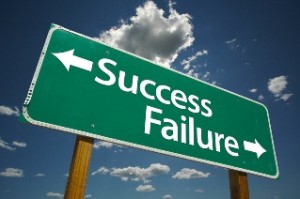 In the modern business world, we sometimes tout failure as a virtue that almost inevitably leads to success. Popular examples include Thomas Edison’s 1,000+ unsuccessful attempts to improve the light bulb before hitting on the right solution, and Bill Gates’ unsuccessful first business. Experts tell us repeatedly to fail forward, to fail as fast as possible, to dare to fail—because it makes us smarter and better in the long run.
In the modern business world, we sometimes tout failure as a virtue that almost inevitably leads to success. Popular examples include Thomas Edison’s 1,000+ unsuccessful attempts to improve the light bulb before hitting on the right solution, and Bill Gates’ unsuccessful first business. Experts tell us repeatedly to fail forward, to fail as fast as possible, to dare to fail—because it makes us smarter and better in the long run.
So it was refreshing to encounter a Harvard Business School working paper called “Performance Persistence in Entrepreneurship” that takes the opposite perspective.[i] The authors discovered that brand-new entrepreneurs succeeded just about as often as those who had tried before and failed (18% vs. 20%). The most successful entrepreneurs were those who had already succeeded, but even they succeeded only 30% of the time.
At the risk of oversimplification, the authors point out that statistically, failure doesn’t necessarily result in eventual success…a common-sense conclusion, frankly. (We all know that persistence and tenacity are what really matter, right?) Furthermore, they admit they looked at a relatively narrow business segment and didn’t control for a number of factors that might skew the results.
Normally, I’d take something like this with a grain of salt. However, they were the first to actually test the assumption that failure is positive in the long run. As several commentators have pointed out, we have no real scholarly work that proves failure is good for the soul; we just assume that. On the other hand, we do now have research suggesting failure doesn’t necessarily contribute to later success.
While I believe you should focus on your strengths, I also believe failure can help you define your weaknesses—especially in terms of the things you should never waste time on again. If I keep failing at something, it’s a pretty big clue I should get some help, instead of continually banging my head against a wall. In general, then, I perceive the hypothesis that failure can help you succeed in the long run as a truism that doesn’t require scholarly proof.
The keyword in the above statement is can. Failure doesn’t automatically anoint you with the oil of future success. Some of my speaker colleagues have gone a bit too far on the platform in suggesting it does…or in outright saying so.
Failure has no special qualities in and of itself; it’s what you do with failure that matters. It offers another opportunity to learn, allowing you to rise phoenix-like from the ashes, to take another grab at the brass ring. Maybe you’ll get it next time; maybe you won’t. But if not, don’t take the failure personally, because that kills your confidence and destroys your chance to profit from your mistakes. Make every effort to take something instructive away from your failure—or you’ve just wasted your time.
I won’t tell you there’s no such thing as a failure. Of course there is. But don’t ignore it, refusing to learn anything, and hope to luck into success. Failure to learn from failure inevitably leads to more failure, in a vicious downward spiral.
Accountability action step:
After a failure, always pull some tidbit from the wreckage and take it to heart. There may be a few intact bricks left standing—successful aspects or ideas within the broader failure—that can serve as a foundation for building once more.
[i]Gompers, Paul, Anna Kovner, Josh Lerner, and David Sharfstein (2008). “Performance Persistence in Entrepreneurship.” Harvard Business School Working Paper 09-028.



[…] right solution, and Bill Gates’ unsuccessful first business. Experts tell us repeatedly to …read more Via: The Productivity […]